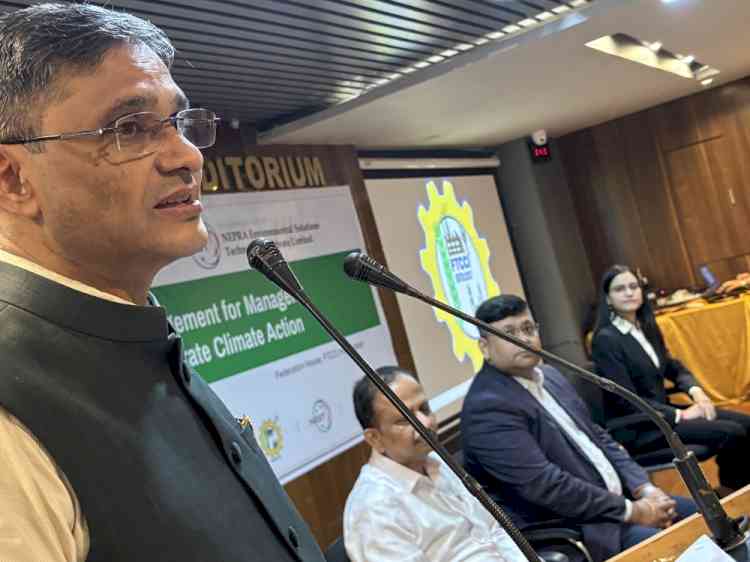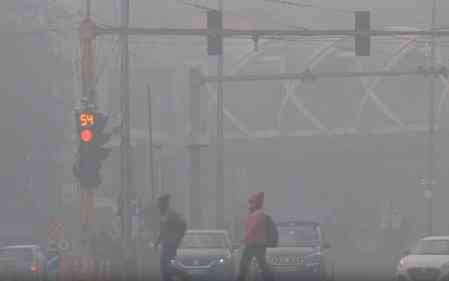FTCCI hosts a program on GHG Inventory Management for Managers, focusing on Building Reliable Data for Corporate Climate Action
The program was aimed at building industry capacity in Greenhouse gas (GHG) accounting, climate data management, and ESG-driven corporate reporting.

The Earth is already 1.1°C warmer today than it was in the 19th century: Bhavik Mudiya, Expert
Hyderabad, November 27, 2025: The Environmental, Social and Governance Committee of The Federation of Telangana Chambers of Commerce & Industry (FTCCI) conducted a full-day technical training program titled “GHG Inventory Management for Managers: Building Reliable Data for Corporate Climate Action” at FTCCI Surana Auditorium, Federation House, Red Hills, Hyderabad on Thursday.
The program was organised in collaboration with NEPRA Environmental Solutions Technologies Pvt. Ltd., which served as the Knowledge Partner.
The initiative was aimed at building industry capacity in Greenhouse gas (GHG) accounting, climate data management, and ESG-driven corporate reporting.
Participants from diverse sectors—including EHS, engineering, sustainability, supply chain, HR, academics, and students—benefited from an in-depth understanding of Scope 1, Scope 2, and Scope 3 emissions, GHG calculation methodologies, global frameworks such as ISO 14064 and the GHG Protocol, and hands-on training on digital tools for climate data management.
Delivering the welcome address, R. Ravi Kumar, President, FTCCI, highlighted the critical need for accurate and transparent GHG reporting.
“Reliable GHG inventories have become indispensable for organisations striving to meet India’s net-zero commitments. Today’s business environment demands both climate intent and robust climate data,” he said.
“Mr Ravi Kumar urged the 100 delegates attending the program to actively spread the knowledge they acquired, emphasising that combating climate change is a shared responsibility. ‘It is our collective duty to take what we learn here and multiply its impact across our organisations and communities,’ he added
G. Bala Subramanyam, Chair, ESG Committee, FTCCI, in his introductory remarks, emphasised the growing complexity of climate disclosures and stressed the importance of building internal capabilities to generate accurate, consistent, and audit-ready GHG data.
“There is no longer a debate about climate change—its impact is real, visible, and unfolding around us. When I moved from Nellore to Hyderabad years ago, we barely needed a fan. Today, fans are not enough; air-conditioners have become a necessity. In my hometown, ACs were once rare—now every apartment has three or four. This is how drastically our environment has changed. Sustainability is no longer ‘moral science’; it has become ‘business science’—a strategic imperative with purpose, not just good intention.”
Technical sessions were led by: Bhavin Mudiya, Founder – EHS Solutions, NEPRA Environmental Solutions Technologies Pvt. Ltd.; Nivedita Pradhan, Deputy Manager – ESG, NEPRA Environmental Solutions Technologies Pvt. Ltd.
The experts covered climate policy background, emission factor databases, ISO standards, Scope-wise emission calculation methodologies, case studies, validation and verification of GHG statements, and tool demonstrations, including the ESG Konnect Tool.
Participants appreciated the practical insights, real-world examples, and clarity provided on bridging data gaps and strengthening organisational climate reporting frameworks.
“Climate Change, Sustainability, and ESG have become the new buzzwords, but their implications are far deeper,” said Bhavin Mudiya.
“Sustainability is simply about preserving natural resources for future generations. Climate, on the other hand, is defined over the long term—and that definition itself is changing before our eyes.”
He added, “The seasons we once knew no longer exist in the same form. We now experience heat waves in the rainy season, unseasonal summers, and unpredictable weather patterns. There is no clear distinction between seasons anymore.”
Highlighting global trends, he noted: “The Earth is already 1.1°C warmer today than it was in the 19th century. Nations across the world are now racing to limit global warming to 1.5°C. This urgency reflects how rapidly climate change is reshaping our environment, our lives, and our future.”


 City Air News
City Air News 










